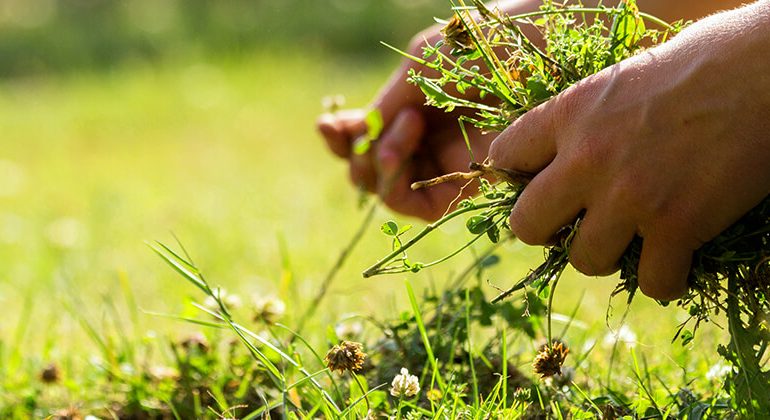
If you’re looking for ways to keep weeds at bay without using harsh chemicals, you’ve come to the right place. This post will discuss some methods of natural weed control that will help you achieve a healthier lawn. We’ll cover mowing, watering, and other techniques that can help get rid of pesky weeds without resorting to chemical solutions. Let’s get into it!
Check out this guide to help you identify common lawn weeds.
Mowing
Mowing your lawn is one of the most effective ways to prevent and get rid of weeds. Mowing your grass at a height of 2-3 inches helps shade out any weed seeds that may have landed in your lawn. The more light blocked from the soil surface, the fewer opportunities for weeds to grow. Additionally, if you regularly mow your lawn with a sharp blade, you can cut off any new shoots or seedlings before they have a chance to spread throughout your yard.
Watering
Watering isn’t just important for keeping your grass healthy – it also helps with weed control. Properly watering your lawn is key when it comes to preventing weed growth. Applying too much water encourages shallow root systems and allows more sunlight to reach the soil surface – something we want to avoid when trying to block out potential weed growth. Instead, focus on infrequent deep watering sessions that will promote deeper roots and prevent weed seeds from germinating.
Fertilizing
Applying fertilizer is another great way to combat weeds in a natural way as it provides essential nutrients for turf grasses while limiting available nutrients for weeds. The best time to fertilize is during fall and spring months when turf grasses are actively growing while many common broadleaf weeds are dormant or not actively growing due to cold temperatures. Stick with slow-release organic fertilizers over synthetic ones as those are better for promoting strong turf grass growth while discouraging weed growth at the same time.
Mulch
Adding mulch around flower beds or gardens can be an effective way of controlling weeds in certain areas of your landscape as well as adding valuable organic matter back into the soil over time as it breaks down naturally. However, make sure not to add too much mulch around trees or shrubs as this can cause damage by blocking oxygen from getting into their root systems which can lead them becoming stressed or dying off over time.
Weed Them Out
Keeping weeds away doesn’t have to involve harsh chemicals – there are plenty of natural solutions available if you know where to look! Regular mowing and watering with proper fertilization will go a long way towards maintaining a healthy lawn free from invasive plants and weeds!
Additionally, adding mulch around garden beds or along pathways can help block out light from reaching potential weed seeds before they have a chance to grow in those specific areas without causing any harm to trees or shrubs nearby! With these tips in mind, you’ll be able to maintain an attractive landscape naturally!










